| Srl | Item |
| 1 |
ID:
107911
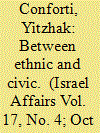

|
|
|
|
|
| Publication |
2011.
|
| Summary/Abstract |
This article addresses two basic issues of the Zionist vision: 1. Was the Jewish state planned as an ethnic or civic state? 2. What was the character of the Zionist vision? Was it a holistic utopian vision, or a minimalist vision for creating a Jewish national state? This research concludes that the state of Israel, which developed from a nationalist ethnic-cultural movement, integrated within it ethnic values as well as Western civic values. The founders of the central wing of the movement all aspired to create a Jewish national state that upheld these values. Furthermore, the planning of the Zionist Utopia by the central group of the Zionist leadership was usually realistic and minimalist, not holistic. This position enabled the leadership to strike a balance between vision and reality, and to address the historical circumstances on the path toward establishment of the state.
|
|
|
|
|
|
|
|
|
|
|
|
|
|
|
|
| 2 |
ID:
122068
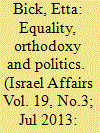

|
|
|
|
|
| Publication |
2013.
|
| Summary/Abstract |
National service was a controversial issue in Israel in the early years of the state. A law requiring religious girls exempted from the military to do two years of mandatory civic service was passed in August 1953 and never implemented. This article examines the political controversy surrounding the adoption of the national service law and concludes that David Ben-Gurion advanced the law mainly for political reasons in order to counterbalance concessions made to the orthodox. Moreover, consistent with his mamlachtiyut (statist) philosophy, he was unwilling to consider any compromise proposals other than a mandatory government-run programme. Pressure from the religious parties caused his successor, Moshe Sharett, to concede on the implementation details, voiding the law of content. Subsequent governments acceded to orthodox demands to freeze the law. In 1971, a more pragmatic Labour government headed by Golda Meir instituted a programme of voluntary national service which provided needed manpower to the development towns and fulfilled the wish of girls from the religious Zionist sector to give service to the nation.
|
|
|
|
|
|
|
|
|
|
|
|
|
|
|
|
| 3 |
ID:
108256
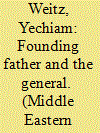

|
|
|
| 4 |
ID:
118381
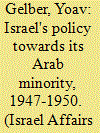

|
|
|
|
|
| Publication |
2013.
|
| Summary/Abstract |
In the absence of preconceived strategies - despite several pre-state attempts to prepare blueprints for tackling the Arab problem - Israel's early Arab policy was shaped in a process of trial and error, fluctuating between ideological aspirations and good intentions (or wishful thinking) and the needs on the ground: the 1948 war and its consequences, the wide-open borders and regular infiltration, and the fear of a second comprehensive war with the Arab states.
|
|
|
|
|
|
|
|
|
|
|
|
|
|
|
|
| 5 |
ID:
122062
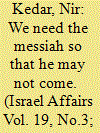

|
|
|
|
|
| Publication |
2013.
|
| Summary/Abstract |
In his speeches and writings as Prime Minister, David Ben-Gurion often used messianic language. In the late 1950s this policy evoked strong criticism in wide circles of the Israeli political and intellectual elite. The fear was that the combination of sweeping messianic ideas and Ben-Gurion's political might would inflict an irreparable blow to Israeli democracy. This article shows that, contrary to the claims of prominent Israeli intellectuals, Ben-Gurion's 'messianism' did not reflect a pretension to hasten the end of history but a desire to use the Jewish prophetic vision as a compass that would spur Israelis to express their human sovereignty and create a civilized society.
|
|
|
|
|
|
|
|
|
|
|
|
|
|
|
|